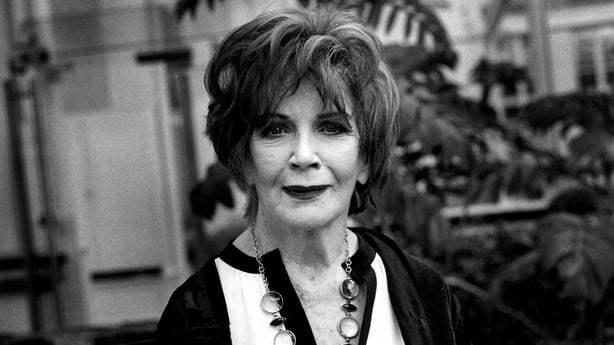President Michael D Higgins has led tributes to Irish writer Edna O'Brien, following her death at the age of 93.
Ms O'Brien died in London on Saturday after a long illness.
In a career spanning more than 60 years, Ms O'Brien wrote more than 20 novels and worked well into her 90s.
She wrote The Country Trilogy among other books, plays and short stories.
Her frank treatment of sexuality in the trilogy of novels that began with The Country Girls and included The Lonely Girl and Girls in Their Married Bliss, shocked Irish society.
Several of her novels were banned by the Irish censor. In some instances her books were also burned.
Mr Higgins described Ms O'Brien as "a fearless teller of truths" and "a superb writer possessed of the moral courage to confront Irish society with realities long ignored and suppressed".
"Through that deeply insightful work, rich in humanity, Edna O'Brien was one of the first writers to provide a true voice to the experiences of women in Ireland in their different generations and played an important role in transforming the status of women across Irish society," he said.

RTÉ Archives: Edna O'Brien in profile
He also said it "important to remember the hostile reaction" that her work provoked among "those who wished for the lived experience of women to remain far from the world of Irish literature".
The President described the banning of her books as "shameful", and said her work is now "recognised for the superb works of art which they are".
Taoiseach Simon Harris also paid tribute to Ms O'Brien, describing her as "a brave, gifted, dignified and magnetic person".
"Ireland has lost an icon," he said.
Mr Harris said that The Country Girls is "a remarkable piece of work but still a landmark moment for Irish women and society".
'Works of art that are going to last forever'
Dr Maureen O'Connor, senior lecturer in English at University College Cork, described Ms O'Brien as one of the greatest writers of the 20th century, who kept writing well into the 21st century, continuing to produce "works of art that are going to last forever".
Speaking on RTÉ's Morning Ireland, she described her as a truthful person, brave, and a trailblazer for young female writers, but also for young writers in Ireland, enabling a certain way to approach Ireland, whether with difficulties or joys.
"While she was unsparing in her depiction of how difficult life can be in Ireland, especially for young women, she did it with deep love and never stinted on the joy. We must acknowledge how incredibly funny she could be, this is something that isn’t often observed about her work," said Dr O'Connor.
She added that she had great sensitivity and her powers of observation were "unparalleled". She got "every detail right".
Speaking about the censorship that Ms O’Brien experienced and her reaction to that, Dr O'Connor said that at the beginning she was amused and expected it, and was hard headed about the realities of a single mother trying to make a living, but that this was not the case in later years.
"She saw it at first as something that could potentially raise her profile and make her a bit of a scandal, but as the years went on, it hurt her," Dr O'Connor added.
She explained that Ms O’Brien was not given major reviews and had not received an Irish award in the 1990s despite having been writing for many years, that this disappointed her and was a source of hurt.
Fellow author Colum McCann said other writers "followed in her slipstream".
Speaking on the same programme, he said "there was a lot of shrapnel came Edna O'Brien's way. But in many ways, we followed in her slipstream all the way from the 1960s".
"So, I think that she was almost like an advanced scout for the Irish national spirit and she was well, well ahead of her time".
He added that "it's a cause of celebration to think about her work and how powerfully she has engaged with Irish literary society".
'She loved writing more than anything'
Writer and director of the forthcoming documentary 'Blue Road: The Edna O’Brien Story’, Sinead O'Shea, said that Ms O'Brien wrote every day, and that was all she ever wanted to do.
She explained that from working with her on the film in recent times, that she was committed to making the film to right a lot of wrongs and reflect on the cruelty and the times she was treated very badly throughout her career.
"That was one motivation," she said, adding that she would say also that she made some misjudgments of her own along the way.
She described Ms O'Brien as a workaholic, and that she wrote every day even up to the time of her death as she was trying to finish a book.
"She loved writing more than anything," said Ms O'Brien.

